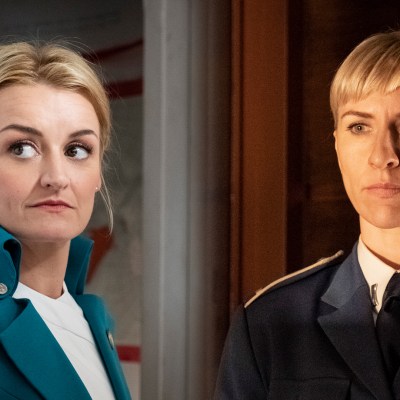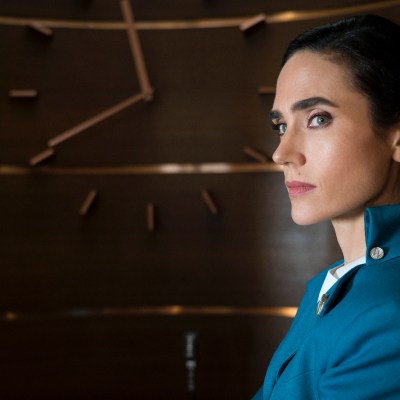Snowpiercer Episode 1 Review: First, the Weather Changed
With its first episode, does Snowpiercer the TV show live up to the reputation of the film, or will the train derail?

This Snowpiercer review contains spoilers.
Snowpiercer Episode 1
Before I discuss the series Snowpiercer, I need to be honest. I haven’t seen the movie. I’m going to at some point, but probably not during this first season of the series. I’d like to treat the series as a stand-alone thing as much as possible, and I’ll leave comparisons to others. With that out of the way, the television show, which is a prequel to the movie, deserves to be looked at on its own merits, and I feel qualified to do so. Fortunately, the show provides no barrier to entry for those unfamiliar with the series, thanks to a pretty neat opening narration set to animated footage of the 1001-car Ark train and the riots that greeted the train’s departure from Any City, USA prior to the biggest of all chills.
There’s a ruthless efficiency that still leaves gaps in the way the show’s setting is established. We find out pretty quickly that the visionary Mr. Wilford is the man who got the train off the ground, using the might of Wilford Industries and the extremely expensive cost of tickets for the very same rich and powerful people who ran the earth into the ground and ruined the climate of the thing, necessitating the establishment of the train in the first place. The class system is also established ruthlessly, as the passengers are segmented by ticket class, with even the lowliest of Third Class workers living much better than the “tailies,” the poor people who forced their way onto the train and have, thus far, refused to be broken by being trapped in the caboose and fed gross-looking blocks of gelatinous rations in exchange for slave labor or worse.
For whatever reason, the tailies are allowed to continue to exist. That reason is easy enough to guess after watching the events of “First, The Weather Changed.” There always needs to be someone lower. Being reassigned to the maintenance tubes running under the length of the train would be bad; being exiled to the tail might be worse than being locked in the prison of the Drawers and put to permanent sleep. Likewise, the allure of betterment continues to exist, even for the people in the tail, who might scheme to be picked for an internship as a Third Class laborer or, for those too old to make an internship, violent insurrection and the hope of a better life further up the train.
The division of classes is obvious, and driven home the first time director James Hawes transitions between Melanie (Jennifer Connelly), the voice of the train and the person in charge of hospitality, and Layton Well (Daveed Diggs), a former homicide detective turned tailie who suffers in the dark, cramped tail-end of the train, waiting for the day that those further up the train decide to cut their rations completely, rather than just in half. They have the carrot of improvement and the stick of being starved to death or, more likely, lose an arm when they act up. Despite that, or because of that, the tailies are preparing to advance their station in live literally, sharpening spears and knives in preparation for the inevitable violent class war against the superior forces of the rest of the train, the thin blue line of the Brakemen and their jack-booted Hospitality cohorts.
Hawes does a solid job of making the Tailies appropriately grimy, but it’s the scenes of upper-class living that really throw things into perspective (the tailies aren’t traveling in conditions all that worse than a discount airline, while the First Class passengers travel in the glossy white corridors of an Apple designer’s dreams). There might not be wood chips enough for smoked salmon anymore, but watching Melanie eat a bento box of immaculately-rolled fresh sushi near the end of the episode puts the black gluten mash strips fed to the tailies look even more disgusting by comparison. Even the living conditions of the employees are far better than the living condition of people in Third Class or lower; it’s no wonder people like Zarah (Sheila Vand) are willing to leave their friends and family behind for a chance at even a slightly better life, and why First Class passengers are so keen to keep the rabble at a safe distance.
Any time there are strong class separations with very limited to no chance for advancement and scarce resources, there are going to be issues, and when you’re trapped in tight quarters with no real escape or chance to change the scenery, ahem, it’s only going to be worse. Quarantine, even in luxury, is still quarantine, particularly when the outside world is -100 degrees Celsius. With a shocking, horrifying murder, the class issues become more apparent, and the only person who is able to investigate the crime is a former homicide detective turned tailer, Layton. If he can be convinced to take on the job.
Given the importance of solving the crime to keep the third-class passengers from disrupting the necessary services of the train, it’s not surprising that the train’s security detail, led by Lead Brakeman Roche (Mike O’Malley), would turn to the man who might be the only surviving homicide detective on the planet. There are others with police backgrounds, like Till (Mickey Sumner), but most police officers, even crooked ones, aren’t the kind of folks who make enough money to end up on humanity’s last hope. The security forces on the train are either Hospitality workers who are low on the totem pole or Brakemen whose only response to a problem is to bash it with a club or cut off its arm to teach the others a lesson.
There’s nothing especially subtle about Graeme Manson’s script, but subtlety is something that a sci-fi show like this can’t afford out of the gate. The world of Snowpiercer has to be established, and quickly, to hook viewers. A dismembered, emasculated corpse and a homicide detective from the wrong side of the train are a solid beginning, further reinforced by a killer action sequence in which Pike (Steven Ogg, always a welcome addition) and company stage a daring breakaway from their caboose at great cost of life only to advance one car from where they started. Friction or not, Pike, Layton, and the rest of the tailies are united, not by race or gender or age, but by class. Literally, they aren’t one, but Layton will provide them some chance to change their situation, if he’s willing to play ball with the powerful voice of the train, Melanie. He just has to swallow a lot of pride first.
Snowpiercer is nothing new, but it’s entertaining enough as a divergence, and the setting proves surprisingly poignant considering the current lock downs in place around the world. Police procedurals are only as sharp as what their cast can provide, and Daveed Diggs and Jennifer Connelly are two very skilled performers, both able to find their feet with their characters in fairly short order, with the Connelly especially able at showing a different side to Melanie as she finally gets the opportunity to break character and relax after a very stressful day of keeping Snowpiercer from tearing itself apart at the seams.
Violent revolution can only advance the tailies so far, as shown vividly by their failure to make it four cars to the electrical coupling they were planning to use as a hostage against the rest of the train. However, with friends on the outside, plans can be a little bolder than simply grab a train employee and start stabbing. Grabbing space is well and good, but it’s what you do after it that matters. In an ecosystem as precarious as the one on the great train, any change is capable of destroying the whole system, be it the social system or the hydroponics that keep the First Class in avocados and the tailies in nutrient jelly.
Keep up with Snowpiercer news and reviews here.


